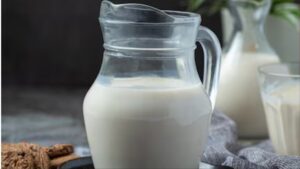
It was just as COVID was coming to an end that we began to notice empty shelves where milk should have been. There always seemed to be some reason, for the shortage, that didn’t make much sense, but after a day or two, milk would, once again, appear on the shelves, so most of us didn’t really think too much about it.
But only a few days ago, when seeing a story on the evening news, showing trucks filled with imported milk from Poland, something didn’t seem quite right. It was then that I began to look into the situation as to why the “land flowing with milk and honey” would need to import its milk from a country whose history has a checkered past as it relates to the Jewish people.
Having an edge on the information, since my husband once worked as the head of a dairy on his kibbutz for 10 years, he confirmed an article I read where one farmer said the potential production of milk from Israeli cows is greater than the needed consumption. If that’s true, then why would there be a shortage of milk?
The same article quoted that farmer saying: “If the shelves are empty, that is because someone has an interest in that shortage.”
So, what’s the real truth about Israel’s milk problem? It starts with the fact that dairy farmers have had to absorb significant increases in feed, medications and salaries as it relates to their businesses. This means that companies, which buy the raw milk from the farmers, such as Tnuva and Tara (two of the biggest dairy manufactures in Israel) must pay them more money. In turn, these companies must request an increase in their own prices. When they recently wanted a hike of 16%, the government, which regulates regular 1% and 3% milk (not including specialized milk, such as lactose-free or almond milk, etc.) only agreed to a 9.28% increase. This resulted in regular milk being an unprofitable item to manufacture. Obviously, if there is no incentive to produce it, due to no profit, this is what causes the lack of milk. For these companies, they would rather use the raw product to produce cheeses and other dairy items which are non-regulated, allowing them to get higher prices and greater profit.
But instead of working with farmers, suppliers and supermarkets to find a viable solution to the problem, Finance Minister Bezalel Smotrich cancelled the 40% tariff on milk imports for a period of three months, making it feasible for shipments of Polish milk to supply the present lack in Israel.
Although they say that this will not change anything for farmers, because their raw milk will continue to be purchased by the dairy companies, it’s clear that our farmers are against imports as any kind of solution, and who can blame them? There simply is no good reason to enrich importers over our own farmers and dairy companies.
Another discrepancy is that, while Polish milk is supposedly much cheaper, with savings being passed on to the consumer, according to a number of reports, major supermarkets have ended up paying more money for the imported milk than what they would ordinarily pay for local milk. One would think that they would be loath to do that, but there seems to be some kind of arrangement, unknown to the public, whereby they will mysteriously not lose any money. Again, it seems that there’s a lot we don’t know about these back-room deals.
It’s truly not easy to unravel this milk quandary, because either there are so many facets to the issue, making it hard to comprehend, or much is not being revealed as to the real source of these problems. However, in an attempt to decipher all of the different angles of this matter, one of the dilemmas, being given, is the enormous price difference of raw milk as imposed by our government which, in contrast, is 24% higher than that of the European Union average. This translates into a disparity of 77% in the price of a liter of milk – something for which there is no good explanation.
Farmers, aware of this problem, are not willing to increase production, because it simply is cost-prohibitive to do so, which, again, accounts for their production of other dairy products with a greater profit margin.
Another issue seems to be the lack of workers in the industry. With a quota of foreign workers permitted to enter the country, this further impacts on the ability to produce more milk.
Over the next three months, Smotrich intends to examine all of these issues in order to come up with needed solutions on how to avoid future milk shortages.
However, the fact that Europe has lower milk prices, causing imports to find their way onto our shelves, doesn’t seem like a good fix to an issue that we can surely overcome with just a bit of creative thinking. If we’ve got the cows, as well as the superiority of their milk production, why should we become reliant upon European countries to supply Israelis with milk?
Does anyone suspect the involvement of politics in this equation?
According to Israel Dairy Facts and Figures, “the Israel Dairy Board (IDB) is an organization jointly owned and managed by the Government of Israel, the major processing companies and the dairy farmers.”
Another report suggests that the problem is caused by a “cartel running the Israel Dairy Board, making the results predictable – inefficient dairies and milk prices that are 30% higher than Europe. The dairy board also determines how much milk each farm will produce and farms are forbidden to produce more. When the price for raw milk is so high, prices for dairy products will also be sky high.”
Given that our dairy industry is “considered one of the most advanced in the world, with milk production being about 1.6 billion liters per year, including advanced technologies such as computerized milking, feeding systems, cow-cooling systems and milk processing equipment, combined with unique farm management techniques,” there is no justification as to why we should have to outsource our milk needs to countries, who although less capable and advanced, nonetheless seem to be doing it better than us.
But that’s nothing unusual. Generally speaking, governmental involvement rarely enhances an industry that could be better served by private ownership and fewer restrictions. Consequently, it’s about time that some of our great business minds come up with an alternative to milk production which will benefit farmers and consumers alike, because, if for no other reason, we must live up to our reputation as the land truly flowing with “milk” and honey.



